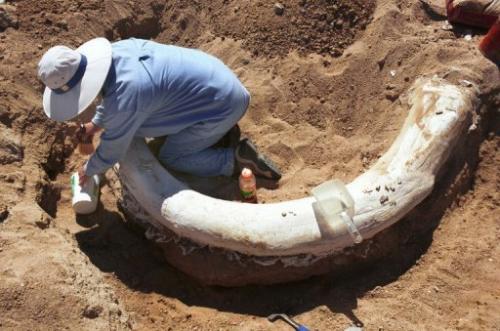
An archaeologist removes dirt from around a 50,000 year old mammoth tusk. Scientists from Japan and Russia believe it may be possible to clone a mammoth after finding well-preserved bone marrow in a thigh bone recovered from permafrost soil in Siberia, a report said Saturday.
Scientists from Japan and Russia believe it may be possible to clone a mammoth after finding well-preserved bone marrow in a thigh bone recovered from permafrost soil in Siberia, a report said Saturday.
Teams from the Sakha Republic's mammoth museum and Japan's Kinki University will launch fully-fledged joint research next year aiming to recreate the giant mammal, Japan's Kyodo News reported from Yakutsk, Russia.
By replacing the nuclei of egg cells from an elephant with those taken from the mammoth's marrow cells, embryos with mammoth DNA can be produced, Kyodo said, citing the researchers.
The scientists will then plant the embryos into elephant wombs for delivery, as the two species are close relatives, the report said.
Securing nuclei with an undamaged gene is essential for the nucleus transplantation technique, it said.
For scientists involved in the research since the late 1990s, finding nuclei with undamaged mammoth genes has been a challenge. Mammoths became extinct about 10,000 years ago.
But the discovery in August of the well-preserved thigh bone in Siberia has increased the chances of a successful cloning.
Global warming has thawed ground in eastern Russia that is usually almost permanently frozen, leading to the discoveries of a number of frozen mammoths, the report said.
